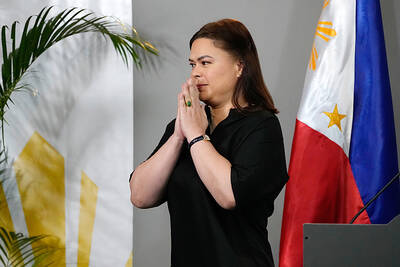This Eid al-Fitr Muslim holiday, Malaysian Sharifa Ahmad is determined to make heads turn in her “Made in Indonesia” outfit —a black flowing chiffon robe with embroidered neckline and matching headscarf hand stitched with Swarovski crystals.
“The dress is perfect for the holy day — modest yet elegant. I’m definitely going to rock my little black Islamic dress,” the 35-year-old civil servant said.
Ahmad is among a growing number of Muslim fashionistas across the region who visit Indonesia to splurge on new festive clothes to celebrate the end of the Ramadanh on Friday.

PHOTO: AFP
The country’s Islamic fashion industry reported a spike in sales of between 20 percent and 30 percent as early as June, thanks mainly to buyers like Ahmad from Malaysia and Singapore, retailers said.
Busloads of women flock to textile markets in cities like Jakarta and Yogyakarta to buy fabric, ready-to-wear dresses and headscarves, textile seller Azizah said.
“They will come in tour buses, choose what they like and buy 10 to 20 pieces of fabric. When they return to their countries, some telephone us to place more orders,” she said.
Ahmad flew on a budget airline from Kuala Lumpur in July, bought the fabric at a textile market in Jakarta and sent it to an Indonesian seamstress “to work her magic” before getting an friend to post it to her in Malaysia.
“I paid 600,000 rupiah [US$66 dollars] for it, half of what I would pay if I had it made in Malaysia. It’s a bargain for designer quality,” she said.
Chiffon, silk and crepe fabrics draping the silhouette in softer pastel colors, highlighted by delicate embellishments on the neck lines, are top fashion picks this year. Plainer headscarves strewn with Swarovski crystals replaced last year’s heavily embroidered beehive and turban craze.
“Some people shop for themselves. Others buy to resell. They would buy 10 yards of fabric of the same design in three colors, tailor the dresses here and sell them at a higher price in their boutiques back home,” textile merchant Vishal Kumar said.
Hoping to cash in on one of the most important dates on the Islamic calendar, Islamic fashion designer Dian Pelangi flew to Cairo, Abu Dhabi, London, Australia and Malaysia several months ago to hawk her wares. She said she sold “thousands” of pieces from her Eid collection at exhibitions in those countries for about 2.5 million rupiah each.
“Arab women are glamorous. They love their bling. My Islamic brown robes with hand-drawn batik detail at the bottom were sold out. Those with beadwork and rhinestones were also popular,” she said.
“Middle Eastern customers don’t bargain much and when they like something, they buy a lot. Some buy 20 to 30 pieces at one go. It’s a very lucrative market,” Pelangi said.
Sales of her Islamic dresses, priced from US$20 to US$300, tripled in July and jumped 10 times last month as local buyers joined in, she said.
Indonesia offers lower prices, quality workmanship, creativity in design and a variety of fabrics, from batik and ikat weaving to gold-threaded songket.
Hassan Marican, director of Singaporean company Second Chance Properties, said it imported 20 percent of its ready-made festive dresses from Indonesia and sold them at double the cost price.
“We buy from Indonesia because it’s cheap. For us businessmen, it all boils down to the price. Also we want some embroidery and beadwork. Our suppliers in China and Malaysia can’t provide that,” he said. “For Islamic fashion, Malaysia and Singapore always look to Indonesia for pointers. They’re very creative. Their headscarf designs are unmatchable.”
Industry Minister MS Hidayat said export of textiles and textile products this year was projected to reach US$10 billion, up from US$9.26 billion last year, or about 8 percent of total exports.
While fashion creations represented only a small fraction of those exports, there is great room for expansion, he said.
“Fashion products have great potential to be developed. We’re rich in natural resources and cultural heritage which can be inspiring and spur creativity,” he said.
He hopes Indonesian designers can help change the world’s perception that Islamic attire is dull, stuffy and unfashionable.
“Sometimes when you mention Muslim or Islam, people develop an allergy. They think it’s a very scary religion,” Indonesian Fashion Designers Association chairman Taruna Kusmaryuda Kusmayadi said.
“Islamic attire can be both modest and stylish. And also fun. They aren’t worn only during special Islamic days by country folks who read the Koran day and night. Modern city women wear them too while filling up gas for their BMWs,” he said. “Islamic fashion is borderless.”

FEROCIOUS FISH-EATER Scientists have found a new species of dinosaur from the Cretaceous Period, a ‘hell heron’ that stalked the rivers, deep in the Saharan desert At a remote Sahara desert site in Niger, scientists have unearthed fossils of a new species of Spinosaurus, among the biggest of the meat-eating dinosaurs, notable for its large blade-shaped head crest and jaws bearing interlocking teeth for snaring fish. It prowled a forested inland environment and strode into rivers to catch sizable fish like a modern-day wading bird — a “hell heron,” as one of the researchers put it, considering it was about 12 meters long and weighed 5-7 tons. The dinosaur presented a striking profile on the Cretaceous Period landscape of Africa some 95 million years ago as it hunted

‘COST OF DEFECTION’: Duterte’s announcement could be an effort to keep allies in line with the promise of a return to power amid political uncertainty, an analyst said Philippine Vice President Sara Duterte yesterday announced she would run for president of the Southeast Asian nation of 116 million in 2028. Duterte, who is embroiled in a bitter feud with Philippine President Ferdinand Marcos Jr, was impeached last year only to see the country’s Supreme Court throw the case out over procedural issues. Her announcement comes just days before her father, former Philippine president Rodrigo Duterte, begins a pretrial hearing at the International Criminal Court (ICC) in the Netherlands over crimes against humanity allegedly committed as part of a brutal crackdown on drugs. “I offer my life, my strength and my future

NOT YET THERE: While the show was impressive, it failed to demonstrate their ability to move in unstructured environments, such as a factory floor, an expert said Dancing humanoid robots on Monday took center stage during the annual China Media Group’s Spring Festival Gala, China’s most-watched official television broadcast. They lunged and backflipped (landing on their knees), they spun around and jumped. Not one fell over. The display was impressive, but if robots can now dance and perform martial arts, what else can they do? Experts have mixed opinions, with some saying the robots had limitations and that the display should be viewed through a lens of state propaganda. Developed by several Chinese robotics firms, the robots performed a range of intricate stunts, including martial arts, comedy sketches and choreographed

DRUG WAR: The former president said there was no campaign to kill addicts, but his speeches called for violence and told police to use lethal force if necessary Former Philippine president Rodrigo Duterte earned global infamy for the deadly drug crackdown that led to his arrest over crimes against humanity charges, despite his huge popularity at home. A profane-lipped populist and self-professed killer, Duterte’s anti-crime campaign resulted in the deaths of thousands of alleged dealers and addicts. Rights groups said many of those killed were poor men, often without any proof they were linked to drugs. Yet, while drawing condemnation abroad, tens of millions of Filipinos backed his swift brand of justice — even as he joked about rape in his rambling speeches, locked up his critics and failed to